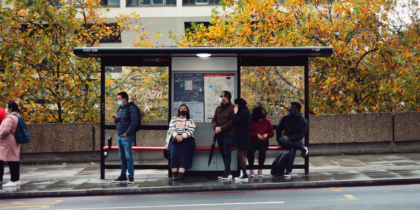Haringey has a population of 268,647 comprising 64.4% from racialised communities – the largest group being non-British white people. It also has a transient population and over 180 languages spoken.
With an Index of Multiple Deprivation ranking of 29, Haringey residents experience high levels of poverty, unemployment, single parents, drug abuse, domestic violence and serious youth violence.
The deprived wards are mainly located in the east of the borough. People living in these deprived areas are more likely to be affected by depression.
For a full description of local needs and assets, check out Haringey council’s Joint Strategic Needs Assessment
Identifying the focus of Better Mental Health Fund
The Public Health Team designed a life course approach focusing on the most deprived areas of the borough. Prevention and promotion activities were culturally appropriate and a mix of face-to-face, telephone and digital approaches.
The identification of local mental health needs was informed by the 2019 Mental Health JSNA, Haringey’s resident Covid-19 survey and engagement with local mental health service providers. It was also shaped by responding to need previously identified through the existing programmes. The potential to demonstrate impact within the relatively short timescale of the Fund was also a factor.
The Better Mental Health Fund in Haringey aimed to provide a comprehensive approach to promoting better mental health for Haringey’s residents, reducing inequalities by targeting areas in Haringey where risk factors for poor mental health are greatest. Badged as Haringey’s Great Mental Health Programme, the interventions:
- Reduce barriers in accessing mental health information and support, by providing in different languages (Good Thinking, Targeted Digital communication campaign and Community Navigators)
- Strengthen communities by increasing social connectedness and reducing isolation, investing in and establishing grassroot organisations (Community Protect, Community Navigators)
- Design interventions to address the mental health consequences of Covid-19, particularly bereavement and loss (bereavement support).
How was the Better Mental Health Fund used?
Better Mental Health Fund projects extended pre-existing services which had been introduced to support the uptake of the Covid vaccine by engaging marginalised groups. The aim was to offer a comprehensive package of prevention.
The Fund commissioned seven projects:
- Community Protect worked with a consortium of large and small providers. Interventions included mental health champions, befriending, coffee mornings and outreach work
- Bereavement support includes Peer Support Groups, Grief Workshops, Mental Health First Aid (MHFA) Training, 1-2-1 telephone support and 10 weeks’ free counselling. These services were provided by Mind in Haringey
- Two Community Navigators were employed to enhance the Local Area Coordinator offer in the most deprived ward in Haringey. Social prescribers provided tailored support to residents as well as establishing self-sustaining community initiatives, such as befriending projects
- Digital mental health organisation, Good Thinking, hosted by the Healthy London Partnership, was commissioned with three other local authorities to coproduce culturally appropriate mental health resources with local faith leaders and Haringey residents. All London residents could access the materials via local authority websites and through various channels including download and print. A targeted digital communication campaign, designed to increase reach and equity of local mental health services and resources, signposted beneficiaries to existing support
- The Great Mental Health Day campaign was led by Haringey Council Public Health and Thrive LDN, and supported by London councils, health and community organisations, NHS London and the Mayor of London. A report detailing impact and identification of learning for future health campaigns has since been released.
- ABC (Achieving a Better Community) Parents provided child health education, facilitated peer support, and empowered parents to share advice and knowledge to maintain and manage the health and wellbeing of their children. It was provided by the Middlesex University Hospitals NHS Trust
- An enhanced domestic violence service for women experiencing mental ill health and at risk of domestic abuse.
Bereavement Support
Mind in Haringey was already delivering prevention services and through the Fund they introduced a model of stepped bereavement support. This included:
- Information and signposting
- Telephone 1:1 support with weekly/fortnightly check-ins with service users, building a relationship and support readiness to join a support group
- Grief workshops
- Mental Health First Aid (MHFA) Training
- Face-to-face peer support groups for people who have experienced bereavement, with a regular membership, and open groups with a fluctuating membership
- Online peer support including Latin American groups, reflective of Haringey’s population.
Staff are recruited from the borough to reduce high local levels of unemployment, with lived experience valued. The recruitment of a Portuguese worker enabled the service to be more accessible.
The service routinely collected wellbeing, demographic and qualitative data to understand access, uptake and performance. A recent evaluation showed positive changes in wellbeing to be statistically significant.
Strengthening Communities
The lead partner for Community Protect was the Bridge Renewal Trust (BRT) which seeks to address health inequalities by providing practical skills, knowledge, information and community empowerment to improve the wellbeing of the wider community and individuals. BRT undertook capacity-building work and, as an established organisation, utilised its well-developed links with other voluntary sector organisations in Haringey.
In partnership with Mind in Haringey and Public Voice, BRT used the Better Mental Health Fund to provide a range of resilience and wellbeing activities to offer support, early help and increase mental health awareness. Groups specifically targeted for engagement include people of colour and residents whose first language is not English, homeless people and rough sleepers, low-income households, people with learning difficulties, older people, and young people Not in Education, Employment or Training. Activities include:
- Mental health workshops
- Community champions
- Social activities to address isolation: sewing, arts and crafts, dance classes, coffee mornings
- Drop-in digital inclusion sessions
- Capacity-building activities focused on increasing mental health awareness and promoting wellbeing – mind mapping, managing money, self-care.
Activities were identified by residents and service users to reflect need, recognising it takes time to build trust and for people to talk about mental health. Stigma and a lack of awareness can inhibit progress, and a patient and persistent approach is needed.
Impacts on local people
The investment was welcomed by local organisations in Haringey; it enabled greater reach and improved access to information, support and signposting for the whole population as well as specific target groups. The Fund also enhanced the capacity of grassroots organisations to deliver a wider range of support, and offered valuable experience in building their expertise in relation to data monitoring.
What have we learnt?
The approach Haringey took to partner with other local authorities in the Good Thinking consortium and across London for the Great Mental Health Day illustrates the benefits of sharing resources and maximising investment. This site highlights the value of a well-developed communication strategy to promote existing services, and to make mental health a ‘good news story’.
Haringey Council has partnered with the National Institute of Health Research to conduct an academic evaluation of the Community Protect Programme.
It is evident that the Better Mental Health Fund offered an opportunity to build on existing initiatives to increase reach, to introduce new services (namely the stepped bereavement support scheme), and to innovate with the targeted digital intervention, enhanced domestic violence support, and co-creation of culturally competent mental health resources.
The short timescale and its impact on coproduction and community engagement was identified as challenging, and meaningful engagement needs to be factored into the time for project delivery.
Several projects will have a legacy, notably those that provided training (for example, the domestic violence training for professionals, Mental Health First Aid and training for councillors) or projects which developed self-sustaining or peer-to-peer elements (for example, the parenting groups and community champions). The council is committed to signing up to DHSC’s Prevention Concordat for Better Mental Health and plans to build on the investment and learning, recommissioning successful programmes.
Local evaluation
The evaluation highlighted the value and importance of interpretation and translation services. Making information accessible and culturally appropriate was central to supporting residents to access early help and destigmatise poor mental health.



